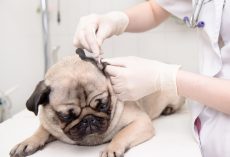PDE is a heartbreaking disease for Pug owners. Find out what this ailment is and how it can affect your pooch. The more informed you are about this disease the better you can help your pooch feel a little better.
You may have heard of Pug Dog Encephalitis or PDE if your a Pug lover, this disease is heartbreaking for Pug Owners.
If you have a Pug that has been diagnosed with PDE it is very important to notify your breeder, this will enable the breeder to make ethical changes to ensure no further puppies are bred from parents of the Pug diagnosed with PDE.
PUG DOG ENCEPHALITIS
Pug Dog Encephalitis is an inflammatory disease of the brain affecting Pug dogs of either sex. The disease is considered unique to the Pug breed. Similar symptoms have been reported recently in Maltese, Pekingese and Yorkshire Terrier breeds but do not seem to be the same disease.PDE is an invariably fatal disease in the Pug which generally affect Pugs between 6 months and 7 years; however, the majority of Pugs affected are between 9 and 19 months of age.
Specific symptoms of PDE include: seizures, pressing of the head against a wall or furniture, a staggering walk, apparent blindness, lethargy, depression, and neck pain. When first presenting symptoms, most pugs simply quit jumping on or off furniture as they once did casually and they appear to have a “stiff neck”.It is believed to be a genetic condition, as litter mates and closely related dogs are often affected, but it also occurs in Pugs born from non-related lines. The disease has no cure.
What causes PDE?The most recent research information on the disease tends to be found on the home page of the Pug Dog Club of America as they are the primary funding underwriter for the ongoing studies of PDE.
How can I prevent PDE in my Pugs?
Since we do not know the cause of PDE, no one knows how to prevent it. If it turns out that PDE is a genetically inherited disease, then Pugs are born with it and the only prevention will be not to breed the parents who are carriers of the disease.
It's unfortunate that this disease is genetically inherited and affects mostly Pugs. However, learning as much as we can about PDE can make us better doggy owners and help our pooches feel better.
For more information on PDE, check out Pug Love.









